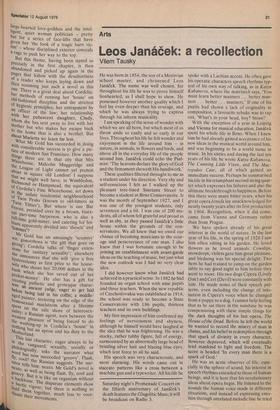Arts
Leos Jandoek: a recollection
Vilem Tausky
He was born in 1854, the son of a Moravian school master, and christened. Leos Jana6ek. The name was well chosen, for throughout his life he was to prove himself lionhearted, as I shall hope to show. He possessed however another quality which I feel lay even deeper than his courage, and which he was always trying to express through his inborn musicality.
Lam speaking of the sense of wonder with which we are all born, but which most of us throw aside so easily and so early in our lives. Throughout his life he felt wonder and enjoyment in the life around him — in nature, in animals, in flowers and birds, and above all in the everyday life of the people around him. Jangek could echo the Psal mist: 'The heavens declare the glory of God and the firmament sheweth His handiwork.' These qualities filtered throught to me as a student under his direction. Very shy and self-conscious I felt as I walked up the pleasant tree-lined Smetana Street to become a student at Brno Conservatoire. It was the month of September 1927, and I was one of the youngest students, only seventeen and a bit. I was one of 200 students, all of whom felt grateful and proud as well as shy, as they passed Janaeek's little house within the grounds of the conservatoire. We all knew that we owed our chance of becoming musicians to the courage and perseverance of one man. I also knew that I was fortunate enough to be joining an establishment with avant-garde ideas on the teaching of music, but just what the new outlook was I had no very clear idea.
I did however know what Jankek had achieved in a practical sense. In 1882 he had founded an organ school with nine pupils and three teachers. When the new republic of Czechoslovakia was established in 1918, the school was ready to become a State Conservatoire with 186 pupils, thirteen teachers and its own buildings.
My first impression of him confirmed my feelings of nervousness and shyness, although he himself would have laughed at the idea that he was frightening. He was a stocky, rather tubby figure, full of energy, surmounted by an abnormally large head of bristling silver hair and blazing blue eyes, which lent force to all he said.
His speech was very characteristic, and most alarming. His words came out in staccato patterns like a cross between a machine gun and a typewriter. All his life he
spoke with a Lachian accent. He often gave his operatic characters speech rhythms typical of his own way of talking, as in Katya Kabanova, where the matriarch says, 'You must learn better manners. .. better manners . . . better . . . manners.' If one of his pupils had shown a lack of originality in composition, a favourite rebuke was to rap out, 'What's in your head, boy? Straw!'
With the exception of a year in Leipzig and Vienna for musical education, Janaeek spent his whole life in Brno. When I knew him he had already gained acceptance of his new ideas in the musical world around him, and was beginning to be a world name in music. In his sixties and during the last ten years of his life he wrote Katya Kabanova, The Cunning Little Vixen, and The Macropulos Case, all of which gained an immediate success. Perhaps he summarised his life in his triumphant second string quartet which expresses his failures and also the ultimate breakthrough to happiness. Before this there were many bitter years, when his great opera Jenufa lay unacknowledged for nearly twenty years after its first production in 1904. Recognition, when it did come, came from Vienna and Germany rather than from Prague.
We have spoken already of his great interest in the world of nature. In the last year of his life, in the spring of 1928 I saw him often sitting in his garden. He loved flowers as he loved animals. Cowslips, snowdrops, violets gave him great pleasure, and birdsong was his special delight. Two hens he had trained to jump on the garden table to say good night to him before they went to roost. His two dogs Cipera (Lively One) and Cert (Devil) were constantly with him. He made notes of their speech patterns, even including the change of into nation in Cipera's voice when he changed from a puppy to a dog. I cannot help feeling that as he sat there in the sunshine he was compensating with these simple things for
the dark thoughts of his last opera, The House of the Dead. Before he left the world
he wanted to record the misery of man in chains, and his belief in redemption through that spark of divinity in every character, however depraved, which will eventually lead mankind to light and freedom. The score is headed 'In every man there is a spark of God.'
He was an acute observer of life, especially in the sphere of sound, his interest in speech rhythms extended to those of human beings, and it is here that his revolutionary ideas about opera begin. He listened to the sounds the human voice made in different situations, and instead of expressing emotion through unrelated melodic line he tried






























 Previous page
Previous page